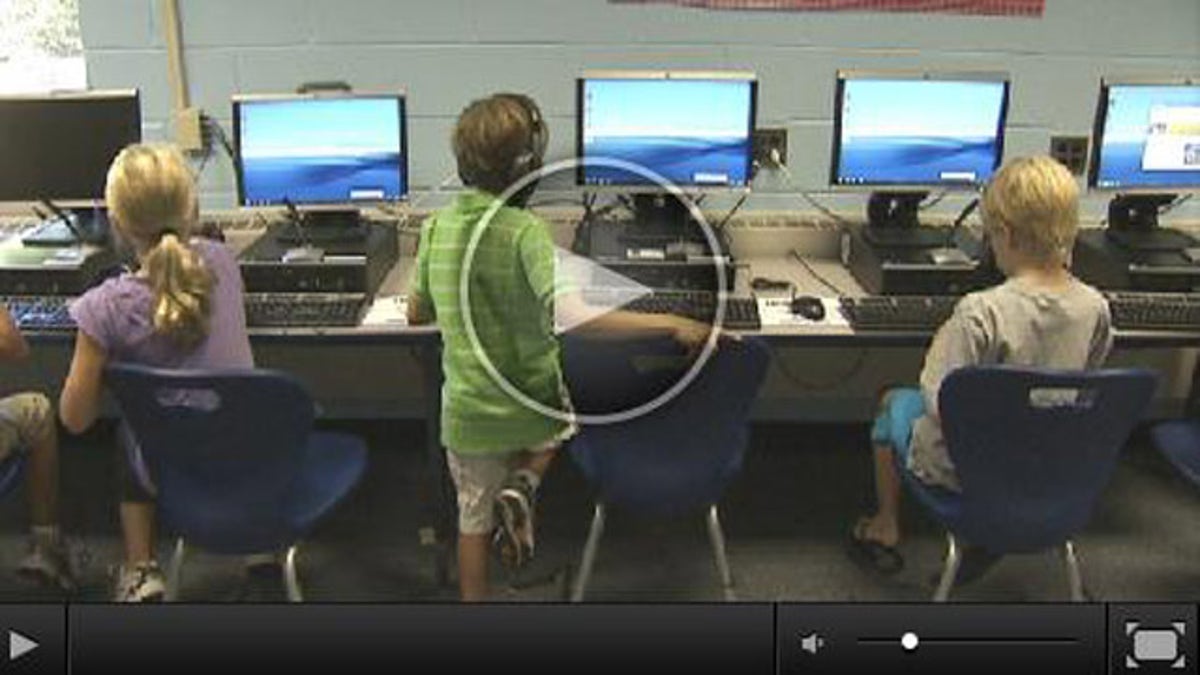
At Ironia elementary school in Randolph, N.J., Spanish class means a visit to the computer lab. In the wake of an $820 million dollar statewide school aid reduction, Spanish teachers are the latest job casualties in an economy full of cutbacks. As several public school districts look to squeeze under the state spending cap, the public school district is replacing Spanish teachers with computers in grades 3-5.
An interactive computer program allows students to complete their lessons individually, by speaking into microphones when prompted by the computer. Words are married with pictures, and students learn how to pronounce them while learning the definition at the same time. If they get the pronunciation wrong, a red “X” appears. A green check mark means they've answered correctly. All while, a regular classroom teacher is on hand to supervise and help with technical support.
Owen Snyder, Randolph Superintendent of Schools says that, before the cut, the township’s budget only allowed for two foreign language teachers among all the elementary schools. Each class got half an hour of Spanish language instruction weekly. With the computer program, students get regular lessons and the district saves nearly $100,000.
The Superintendent says he believes the ideal situation would be to have a foreign language teacher in the classroom several days a week, but that he did not have that choice. In discussing his decision, Snyder explains that world language is not part of the core education curriculum in the state.
"The irony in our world today, when we need more people to know more languages and communicate better, it isn't part of the core," Snyder says. "So, what we did is look at all of programs we absolutely couldn't cut, and put them aside. And then, what could we cut if we could find an adequate substitute?"
Snyder believes technology is going to change the nature of education dramatically. "We are preparing kids for careers that don't exist, and we have got to do it differently. And one of the ways we do it is to use technology effectively." He says there will be far fewer teaching jobs, but there will absolutely still be a need for classroom teachers.
Not everyone agrees, though, that a computer program is a suitable alternative to a living, breathing teacher. Brett Lovejoy, Executive Director of the American Council on the Teaching of Foreign Languages, points out that language learning is a "highly intensive, interactive process" and says the presence of a live teacher is very important.
"If a school needs to cut costs in other areas, are we going to replace an English language teacher in the United States with software?” he says. “It doesn't make any sense. And it probably makes the least sense in replacing foreign language teachers because language learning is one of the most highly interactive and complex processes that we go through as human beings."
Lovejoy goes so far as to say that if it is between no language instruction and a computer program, the choice should be no instruction. "I understand their motivation," he says, "but it's wrongheaded thinking to thing that a software program is going to lead to language learning ... when the students don't learn the language, how is that going to affect them psychologically? I think we have enough problems with education to now, on top of that, throw it all to the students and leave it up to them to learn with the use of software. I think the long term consequences of it could be devastating."
As for the students at Ironia Elementary, they say they like the program so far. When asked if they preferred the computer program to the language instruction they got in previous years, every student in Mrs. Soldivieri's fifth grade classed raised his or her hand.








































